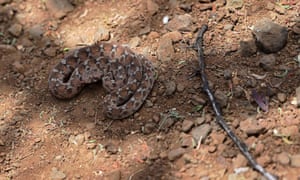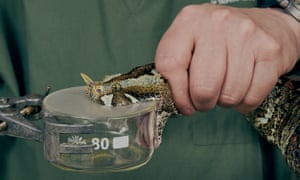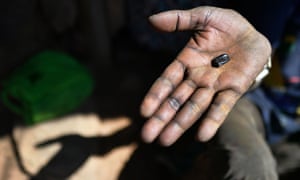British specialist among those aiming to develop ‘next generation’ treatment that could help millions of victims each year
Source: The Guardian
Scientists in five countries, including the UK, hope to find a universal cure for snakebite using the same technology that discovered HIV antibodies.
A new consortium of venom specialists in India, Kenya, Nigeria, Britain and the US will locate and develop antibodies to treat critical illness from snakebites, which harm nearly 3 million people worldwide each year.
The consortium will seek an antidote comprised of “humanised antibodies” rather than conventional animal-based therapies, which can sometimes cause adverse effects in snakebite victims, said Prof Robert Harrison, who heads the centre for snakebite research and interventions at the Liverpool School of Tropical Medicine.
“We’re pursuing what we call the ‘next generation’ of snakebite therapies, which we hope will be able to treat bites from any snake in Africa or India, in a community setting, and without the need for a cold chain,” said Harrison.

“The conventional method of producing antivenom to treat snakebite involves purifying antibodies from venom-immunised horses or sheep and injecting this into patients. This can cause adverse side effects and, because of that, the antivenom has to be administered in a hospital setting.
“That means that victims have to get to hospital from their communities, which are usually several hours away, and in that time there is usually a progression of very severe pathology, which can sometimes lead to severe disfigurements or death.”
Rory Stewart, the UK’s international development secretary, who last week announced £9m in UK aid to fund the research, said the new antidote would help “develop an affordable, accessible, effective treatment” to envenoming if successful.
“In parts of Africa and Asia, snakebites are a daily threat, causing life-changing disabilities or – in the worst case – death,” said Stewart.
“More than 80,000 people die every year from snakebites and because of the huge variety of snake venoms, people often do not get the treatment they need in time, if at all.”
The £9m UK pledge is among a flurry of recent commitments directed at transforming snakebite management. Last week, the Wellcome Trust announced an £80m programme to improve current therapies and develop new ones. On Thursday, the World Health Organization announced a new strategy to halve the number of global snakebite deaths by 2030.

Collectively, these commitments “provide a complete change in snakebite management and real hope for the future”, said Harrison.
“For the past 50 or 60 years, there’s been no substantial investment whatsoever, so this is a profound game-changer. We struggled for the past 20 years to get enough money to fund research on improving snakebite management, and we’re delighted that there’s now funding for us and for other important groups like the International Aids Vaccine Initiative. The more science that’s thrown at this, the better the global outcome will be.”
The novel approach towards finding a universal snakebite cure came about after Dr Devin Sok, an American HIV scientist, realised that the methodology of locating the various strains of anti-HIV antibodies could also be applied to snakebite. Sok then contacted Harrison in Liverpool.

“Our consortium exemplifies how major global health challenges, like snakebite, can be addressed when leaders in different fields are brought together to share ideas, tools, technologies, and lessons learned,” said Sok.
“This type of synergy presents a working model for identifying new solutions to long-standing global health challenges and accelerate product development for neglected diseases.”
Snake venom kills 138,000 people every year and permanently disables another 400,000. Victims are from the poorest parts of Africa and India, where access to antidotes ranges from non-existent to minimal.
Yet antivenom is not the only answer, according to Harrison, who said that in sub-Saharan African, 90% of the available products are ineffective. “They’re either made for snakes that are non-African, or the concentrations are too weak to be effective,” he said.
Ben Waldmann, snakebite programme manager for Health Action International, welcomed the WHO’s target of halving snakebite deaths by 2030, but said governments must first understand the scale of the problem by accurately recording the number of annual fatalities. Many victims live too far from hospitals to seek professional treatment.
“Our research on the ground shows that snakebite victims, faced with no alternative, continue to visit traditional healers as the first point of call,” said Waldmann.

“If communities are empowered and treatment options improved, it follows that the role of traditional healers will be reduced in favour of an effective and reliable health system.”
About 250 types of snake have medically harmful venom. The variety and complexity of their poisons pose huge challenge for health workers.
Existing anti-venom therapies rely on methods from the 19th century: snakes are milked for their venom, which is then injected into large animals like horses, whose antibodies are harvested for use in humans.
But these antivenoms can have harmful – and sometimes lethal – effects on patients, said Harrison, ranging from severe abdominal cramps to anaphylactic shock, because the antibodies are generated from horses or sheep and therefore “foreign”.
The consortium, called the Scientific Research Partnership for Neglected Tropical Snakebite (SRPNTS), will instead focus on creating “humanised antibodies” developed from blood cells collected from snakebite survivors, as well as from large animals including camels, cows and horses immunised with venoms. The aim is to create “the next generation of snakebite therapies that we will engineer to recognise, bind and nullify all of the toxins of the African and Indian snakes”, said Harrison.
However, devising a successful antidote will require roughly four years of pre-clinical work, with another three years – “at least” – for manufacturing and clinical trials, he cautioned.
The consortium nonetheless believes their combined knowledge may radically alter the way snakebites are dealt with globally.

































Leave a Comment
You must be logged in to post a comment.